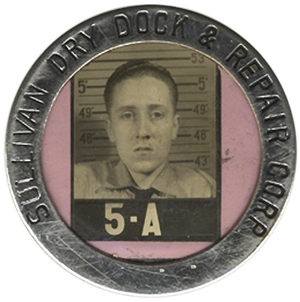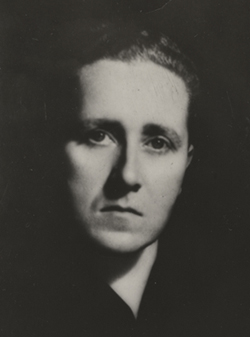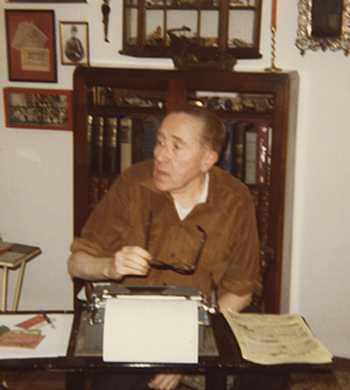JOSEPH WILLIAM MEAGHER
October 29, 1917 -- June 16, 2001
an introduction by Lee Meagher

Early Life
Joseph William Meagher was born in Brooklyn in 1917, the second of five children of Agnes and Joseph Valentine Meagher. In the early 1920s infantile paralysis swept the eastern seaboard and at the age of four, Joe contracted the disease, now more commonly called polio, which caused paralysis and sometimes death in many children. In Joe’s case the convulsions left him with a spine shaped like the harp of his Irish ancestors. At the St. Charles Hospital for Crippled Children in Manhattan, the doctors attempted to straighten his spine by stretching it, strapping him for months, practically immobile, on a board called the Bradford Frame. Joe’s iron will to "never give in, give way or give up" was perhaps born on that device. Since the treatment didn't help, the clinic gave him a plaster cast which he wore daily for support.
At nine Joe was sent to a hospital school run by nuns in Port Jefferson, Long Island to be "made better," as his parents told him. He lived there four years, studying, playing with the other disabled kids, receiving medical treatments, largely ineffective, and reading, always reading. Joe himself felt fine. He just didn’t look the way people were "supposed" to look. One of his main worries at the time was that somebody would steal his beloved history book, carefully mended by now with black tape. Joe practically knew it by heart and carried it with him everywhere he could. On the flyleaf he had written his name in indelible pencil so that no one would get confused about the true owner of the book and swipe it. Joe didn't realize, he later wrote, that a history book was the last thing a kid would steal.
Although Joe’s earliest years were centered in hospitals, he at no time felt dumped there or abandoned, as was the case with a number of the children around him. His parents, one or the other or both, and sometimes joined by other assorted family members, never missed a visit. In his memoir, Broken Yesterdays, there is a photo of Joe with his little brother Bob. Joe’s pockets are bulging with the candy his parents could be counted on to bring. (Perhaps the candy made up for the truckload of Rice Krispies bestowed on the school by some kind benefactor. Since the cereal was made with twenty percent sugar, the thrifty nuns felt that no additional sugar need be served, and the kids had to eat it straight. And eat it and eat it. They – and Joe was right up there with them - were not happy about that.)
Homesick as he was for the warm shelter of the family and the wonderful times he was sure they were all having, always he knew that his parents were doing the best they could for him. In Through Midnight Streets, Joe described an entirely different kind of family, but one still reflecting what he felt so strongly, and he wrote: “There might be something ridiculous about the Grouts, perhaps, but they were a family – a solid little group banded together against the world – and to Chet, who was now old enough to realize how cold the world was, this solidarity seemed more important to him than all other considerations.”
Joe never let his own condition define him or, to the best of his ability, limit him in anything he wanted to do. He didn’t study up on this approach. It was just his, born perhaps in the warmth and support of his family circle. Nor did he allow it to embitter him because he knew instinctively that such a feeling would lead him nowhere. And there were so many other things in the world to find out about, books and writing and history at the top of the list. Later he nurtured this same curiosity and passion for books in his young nephew Robert Meagher, who went on to study history, get two degrees, maintain a lifelong fascination with books, and be forever grateful to Joe for inspiring him. In Joe’s adult years, his many other nephews and nieces and cousins did not forget him, either. The warmth of their affection continued long after their need diminished for his “magic handshakes” (which somehow involved folded five-dollar bills) and the chocolate cigars he delighted them with. Children, in fact, play a major part in two of his novels, Tippy Locklin and The Family Overhead, as well as in The Tiptop Jelly Doughnut, one of the two novellas comprising Demons to Doughnuts.
Joe’s father was an accountant. Times were hard, and one Christmas his father was actually paid in dimes. Joe remembered his father carefully counting out the dimes at the kitchen table while his mother watched, shaking her head in disbelief. She had five children to look after, and those neat piles of dimes were not going to do much to impress the grocers she had to deal with every week.
Yet there were plenty of good times in that household. In the 1950s Joe got his own apartment in Manhattan, but continued to visit the family regularly out on Long Island. The children really seemed to look forward to those visits because Joe was full of jokes and fun, brightening things up for everybody. After dinner, the family would drift over to the piano and start singing Irish songs – it just seemed to happen that way. Joe knew all the words and would sometimes coach the others. He and his two brothers would harmonize happily together as his two sisters watched, giggling, and the others sang along. Songs, in fact, both Irish and otherwise, were often woven into his writing, and he made many dozens of tapes of old songs that he loved and wanted to remember, with detailed card catalogs that he devised for all of them.
Books, Books, Books
Wherever he was, Joe read omnivorously. Over the years he became extremely knowledgeable in many areas, including American and European literature and history. He was passionate about all of his interests and kept extensive lists of books he had read, wanted to read, or wanted to buy in beautiful illustrated editions to be kept permanently and re-read. He always felt it was more satisfying to read a book with pictures than otherwise. Sometimes Joe and I would embrace in the center of our living room, giving us each an extra bonus: he could study his beloved illustrated books on one wall and I could admire some paintings I had done on the opposite wall.
Old New York was one of Joe’s special passions as well as silent films, classical music, popular music from the 1880s through the 1950s, and old-time radio. Early radio and the
newly arrived talkies are prominent players in his novel, The Family Overhead. At one point Joe told me earnestly – very earnestly - that I mustn’t worry about the loss of silent films because so much was being done to recover and restore them. (I quickly reassured him that I wasn’t in the least worried.)
After high school, since he couldn’t afford college, he continued his self-education and at the same time looked for work. This wasn’t easy because of his spinal condition. Finally, through a family connection, he was able to get hired at a large shipyard in Brooklyn. The winds of war were blowing but Pearl Harbor was yet to come. Sent home by the draft board because of his spine, Joe remained at the shipyard for six years as assistant to the personnel director. When war finally broke out, shipyard life became even more frantic since nobody knew if there would be a good ending. It was an electric time. After his two brothers went into the Army, another layer of personal anxiety was added to the urgency of Joe’s hunting up rivet gangs with the special skills required to repair the old, vitally needed ships. At the shipyard Joe soaked up much of the waterfront background for Through Midnight Streets, and later for a World War II novel, The Bristol Warrior Job.
After the war, Joe went to work at the New York State Employment Service as an employment interviewer. The Depression struggles of his family had made him keenly aware that a steady job and a pension were essentials to his peace of mind as well as survival. Since he did not know what earnings, if any, he would have from his writing, he remained at the Employment Service for some 30 years.
At night he wrote. During the day he traveled all over New York City rounding up job openings for the Employment Service, visiting one manufacturing firm after another -- and in those days there were many of them. Meeting so many strangers was not the easiest mission for a shy, self-conscious young man, but he managed it well. The bosses and the applicants seemed to like him, and the job was often quite satisfying. Joe remembered fondly one applicant, a rather large-sized, elderly woman from the Lower East Side, who was so overcome with gratitude for a job opening he had found for her that she impulsively seized his hand and pressed it for a long moment against her ample breast. It was fascinating, he said, to watch his hand sink slowly slowly up to the wrist.
His insights into the lives behind the scenes of those small businesses as well as his firsthand knowledge of the disabled provided much of the authentic material for his thriller novel, The League of the Less Lucky, which revolves around a cockeyed and dangerous conspiracy led by “the Bundle,” a mesmerizing orator with an outrageous goal that enthralls his devoted followers.
In the early 1950s Joe attended a writing class at New York University conducted by Saul Bellow, who eventually connected him with his own agent, Russell and Volkening. With Henry Volkening representing him, Joe’s first three novels were published by Little, Brown.
Joe always remembered with great amusement a lunch he’d had with his editor and Henry Volkening. Little,Brown is an old, established publishing house with headquarters at the time in Boston. Though his editor may not have been old, he was certainly established and may even have belonged to one of the great Boston families or was at least on speaking terms with them. After lunch the three of them sat around smoking cigars. Since this was one of his very first literary lunches, I’m sure Joe was trying to be at his most suave, yet somehow he allowed his cigar ash to tumble into his glass of wine. His editor, Joe said, stared at the wayward ash, stunned by what was happening.
In a letter to Henry Volkening in 1961, Joe wrote:
"As to your threat to become a writer (if you aren't already one - the best kind: pregnant but not yet delivered of), then you must develop an ego large enough to swim a world in, become a master of scowling silences, run from noise, hate all authors except those blessedly dead, take brooding lessons, make everybody's business your business but your business nobody's business, be toughly vulnerable, study envy, learn how to flinch and, most important of all, get yourself an agent as good as the one I've got."
Following the publication of Through Midnight Streets, Joe was awarded a residency at the MacDowell Colony in 1954, 1955 and 1957. There, in the most pleasant and peaceful of surroundings, he was able to work on his next two novels, The Tenement of Dreams and Tippy Locklin.
The Tenement of Dreams, a novel of 1915, drew upon his vast knowledge of Old New York and was published in 1956. The background was so authentic that he received a fan letter from the writer Cornell Woolrich, who apparently assumed that Joe had been alive and kicking in 1915. The Tenement of Dreams was also published in Britain under the title Miss Bantling is Missing, and in Germany.
Tippy Locklin, Joe’s third Little, Brown novel and a highly comic one with a particularly vivid section on Coney Island, was published in 1960. McDonald & Co. published the British edition a year later. In 1963 and 1964 Tippy Locklin was published in four Indian languages: Assamese, Bengali, Gujarati, and Marathi.
At the close of 1960 I was working as assistant to the editor-in-chief of The World Publishing Company. I came across the paperback edition of Through Midnight Streets and wrote Joe a fan letter. Joe must have forgiven me for misspelling "presumptuous" because we were married in 1965. It was a long and exceedingly happy marriage.
For a long time I had yearned to have a cat, but various circumstances intervened. After I met Joe and we began to see each other all the time at each other's apartments, the big question was: where would a cat stay? Joe had never lived with a cat and was uncertain about being host. But then one night he dreamed that a cat with spiky yellow fur was trying to get into his apartment through his fire escape window. I promptly took that dream as A Sign. Thus did a series of cats come into our lives and Joe became thoroughly accustomed to having them sit on his manuscripts. The farewells Joe wrote for two of them, Ginger and Jessie, are on the site here.
Joe’s first three novels received glowing reviews. He continued to work hard at night because he loved everything about writing. The editors, unfortunately, no longer seemed to love him. In spite of their fine reviews, the books had achieved only modest sales and his new manuscripts were rejected many times. Joe’s agent, Hy Cohen, who represented Joe after the death of Henry Volkening, was unable to convince editors that these new books had that mysterious and elusive commercial appeal which publishers courted so assiduously.
Always, though, Joe remained hopeful, convinced that if one book didn’t make it, maybe the next one would. He felt so strongly that he had something to say that would interest people and he was determined to say it. His optimism, humor and unflagging exuberance never abandoned him. I believe he had that same quality which he ascribed to his two central characters in Through Midnight Streets: "a talent for happiness." From his hospital days, when at night he lay stretched out on the Bradford Frame waiting for sleep, he knew there was an emergency when the nurses began scurrying and whispering in the shadows of the ward. If their voices suddenly grew serious, he knew that someone was dying. Hospital scenes like those must have contributed to his deeply felt philosophy that, as he wrote, “life was a boon and the gift of breath a privilege.”
In 2000 Joe contracted pneumonia. He was in intensive care at a New York hospital for six months, most of that time on a ventilator. Through the whole ordeal he was determined to survive because he simply enjoyed living so much. Most of all, perhaps, he was eager to complete the shipyard novel he had been working on before his illness. Finally he recovered enough from the long hospital siege to be sent to a nursing home for rehabilitation.
Afterwards
I loved Joe's unpublished novels and after his death, did not want the manuscripts to molder on the shelves. I self-published first Joe's memoir, Broken Yesterdays. Three novels followed: The Family Overhead, The League of the Less Lucky, and The Bristol Warrior Job, plus Demons to Doughnuts, a duo of two novellas. One of these novellas, The Tiptop Jelly Doughnut, is a children’s book set in a land governed (quite well) by babies. The second, The Lucifer Gypsies, is a supernatural horror tale set in nineteenth-century New England.
The Family Overhead was a fourth novel that I self-published. It’s the story of three orphaned children during the Great Depression when rumrunners wore diamonds as big as knuckles, grocers stacked IOU’s like cans of tomato soup, even cops had their favorite speakeasies, and through it all, the thrill of radio and the talkies held the nation spellbound.
A few years after his death an e-mail addressed to Joe arrived from a young Indian architect who said his sister had read Tippy Locklin to him in Assamese when he was a child. He wrote: "More than any fairy tales or bedtime stories it was your book that would send me to a different world. Since then I have read Tippy till the pages wore out... Till today at any time when I am in need of a friend, it is this book that comes out of the book rack."
How thrilled Joe would have been to read that, and to know that a book about a small boy in Brooklyn had meant so much to a small boy in India.

